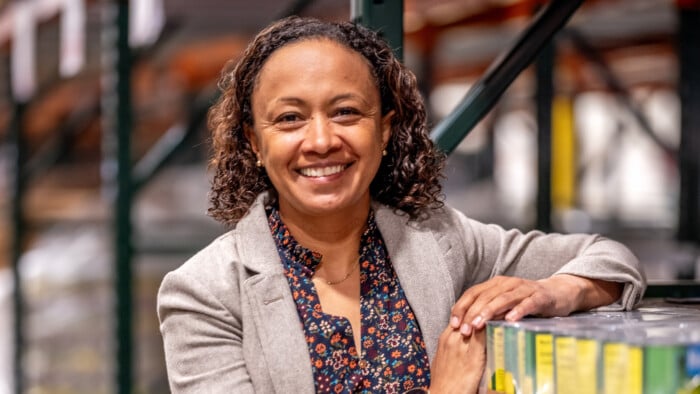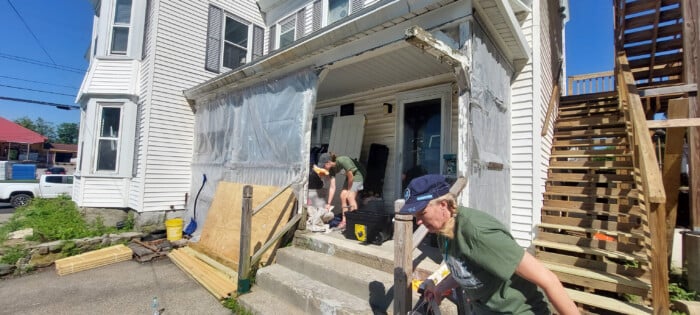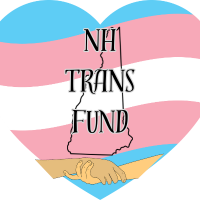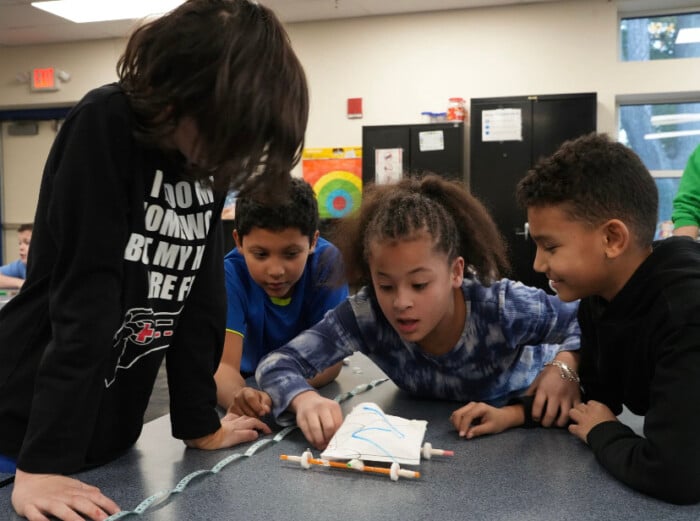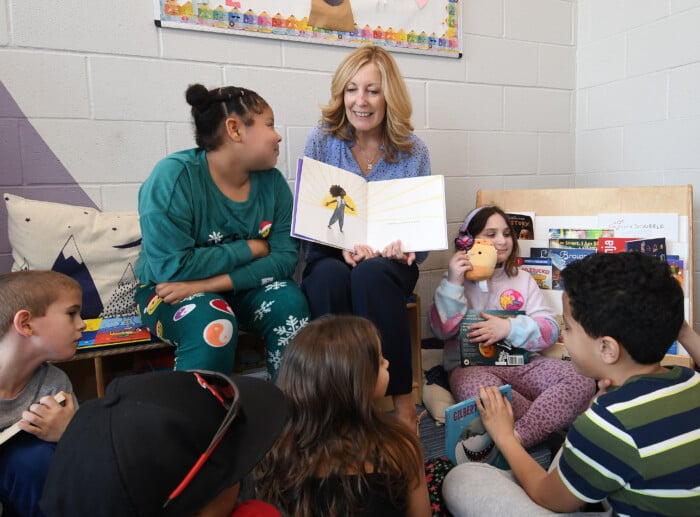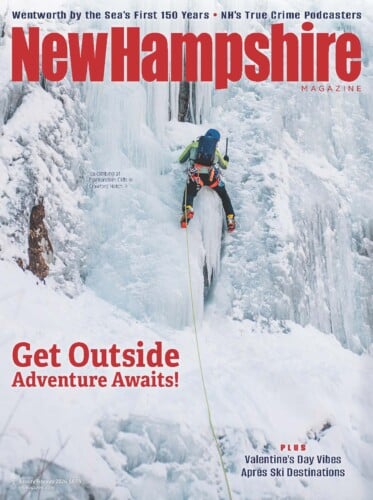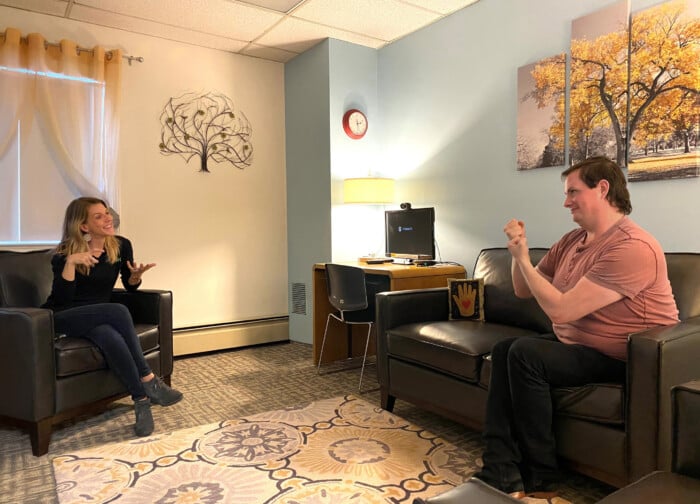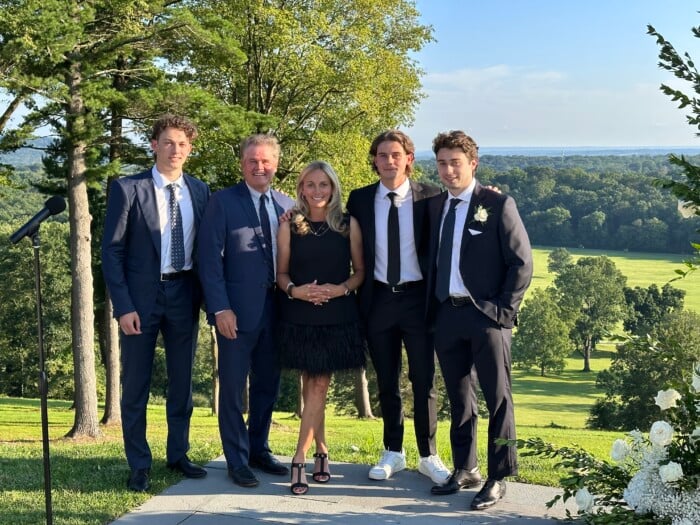Funding Cuts Lead to Culture Shock for New Hampshire Humanities
New Hampshire Humanities regroups to make up for sudden loss of federal funding

The missive arrived under the cover of darkness April 3. The email from the federal government to New Hampshire Humanities was the same one received by all 56 state and jurisdictional humanities councils.
President Donald Trump’s newly created Department of Government Efficiency was cutting the National Endowment for the Humanities budget by 80 percent “effective immediately,” and funding that had already been awarded to the councils would be revoked. There would be no appeals process.
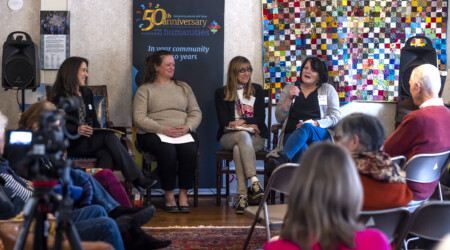
A book discussion with author of “Kookooland,” Gloria Norris, at the Woman’s Club of Concord. Photo by Geoff Forester
The decision left the board of directors and staff of the state council stunned. Now the nonprofit faces the difficult decision of beginning 2026 by cutting its staff of 10 in half and cutting back on programming.
“We were speechless,” said Michael Haley Goldman, who has been the executive director of New Hampshire Humanities since 2021. “It was literally in the middle of the night when we got the email. We were very much taken by surprise because we had no warning that this was going to happen. This was about a little under halfway through our fiscal year.”
Established in 1974 as the New Hampshire Humanities Council, the nonprofit serves as the independent state affiliate for the National Endowment for the Humanities and supports public humanities programs across the state. It was renamed New Hampshire Humanities in 2015.
The nonprofit believes that education is a lifelong process and is vital to each individual as well as to the strength of our communities, our state and the nation. It’s dedicated to making its programs, grants and opportunities accessible to all Granite Staters.
The mission and the vision are summed up in its tagline: “Connecting People and Ideas.”
Charlie Bickford, executive director of New Hampshire Humanities from 1987 to 2001, came up with the slogan. Bickford is regarded as the driving force who put the organization on the map.

Spectators enjoy the Smithsonian’s “Museum on Main Street” exhibit, “Crossroads: Change in Rural America” hosted by the Jefferson Historical Society. Courtesy Photo
“Under his tutelage New Hampshire Humanities grew to become one of the most respected institutions in the state,” Kathy Mathis, who served as the program director for 25 years, says on the nonprofit’s website. “He convinced others that life without literature, life without history, without the study of religion, archaeology, art and the classics was a bereft life.”
Bickford says the humanities bring meaning to life.
“They expand life. They expanded my life,” he says. “It is very important that the New Hampshire Humanities Council exists. I think without the life of the mind we are bereft of part of what it is to be human. The humanities council offers so many ways into that expanded, enriched life. From reading programs, literacy programs for beginning readers, to lectures on historical topics that are on the development of your town, to complicated projects such as the one we did on comparative religions, and so many more. It expands us, it reaffirms for us that life has meaning, and it keeps creating meaning for us.”
But without the financial support from the federal government how will New Hampshire Humanities be able to exist as it has over the past half-century?
“We are a little bit more fortunate in that we don’t receive state funding at New Hampshire Humanities” says Goldman, who accepted the position at the helm of the organization and relocated to Concord following a 12-year career in a variety of leadership roles at the U.S. Holocaust Museum in Washington, D.C. “But we do have to match federal dollars one to one.”
Goldman adds that without the federal support the board and staff had to dig down deep, reorganize, and figure out how to maintain the organization’s work. He acknowledges that there have been a lot of sleepless nights.
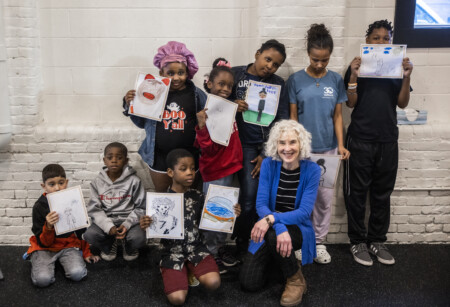
Connections program facilitator and teacher Terry Farish with students at the Amiko Youth Program in Manchester. Photo by Geoff Forester
“It’s been hard, and it’s been hard on the staff. Everybody was worried. Everybody worked very hard. All the team came through,” he says. “I’m proud to say that through the hard work of the staff here and our board we were able to maintain all the current programming that we had committed to. We were able to carry it out through the end of our fiscal year, which ends on Nov. 1. Money that we had not already committed we didn’t spend.”
While New Hampshire Humanities has managed to keep its 10 employees on board through year’s end, there will be a staff reduction by half that is unavoidable. So too is the deep cut in the number of programs to be offered to the public in 2026.
“We will be a lot smaller next year, but we will be sustainable. What’s important is that with or without the federal government in fiscal year 2026 we will still be here, and we will still be doing programs for the state of New Hampshire,” Goldman says. “The community rallied around us, which we appreciate because our plan to be sustainable relies on the fact that the community is there with us and for us as they have been for the last 50 years.”
Bickford says the council is in good hands with Goldman.
“They are rising to the occasion and being very thoughtful and careful about the way they are going about things. They have been developing Plan A, Plan B, Plan C so they are going in a very rational way,” he says. “I think, though I am always an optimist, that they are going to emerge stronger over time, not immediately, but over time.”
Connecting people with ideas for more than 50 years
New Hampshire Humanities has been an important institution and extraordinary resource in the Granite State since 1974. In the wake of severe funding cuts from the federal government, the community rose to the occasion and rallied around the nonprofit and helped it meet the challenge to unlock $50,000 from the Federation of State Humanities Councils with support from the Mellon Foundation, but there are more ways to help. Individual donations and sponsorships from companies and organizations will allow New Hampshire Humanities to continue to offer excellent educational programs, grants, and opportunities across the state and to remain accessible to everyone.
To contribute visit: nhhumanities.org/give.
